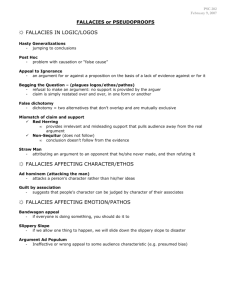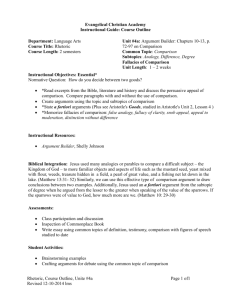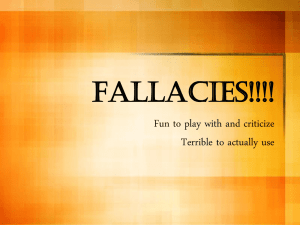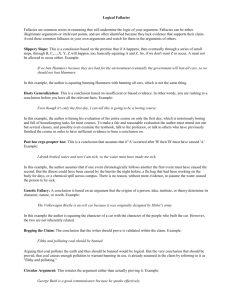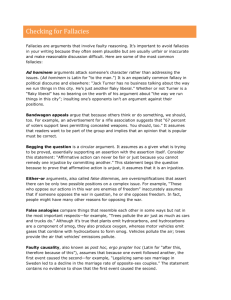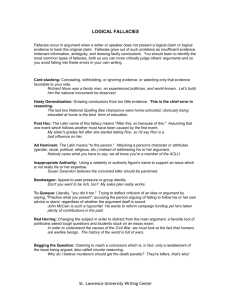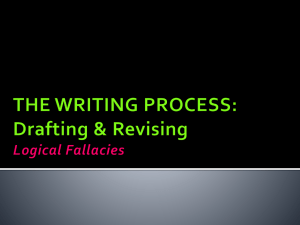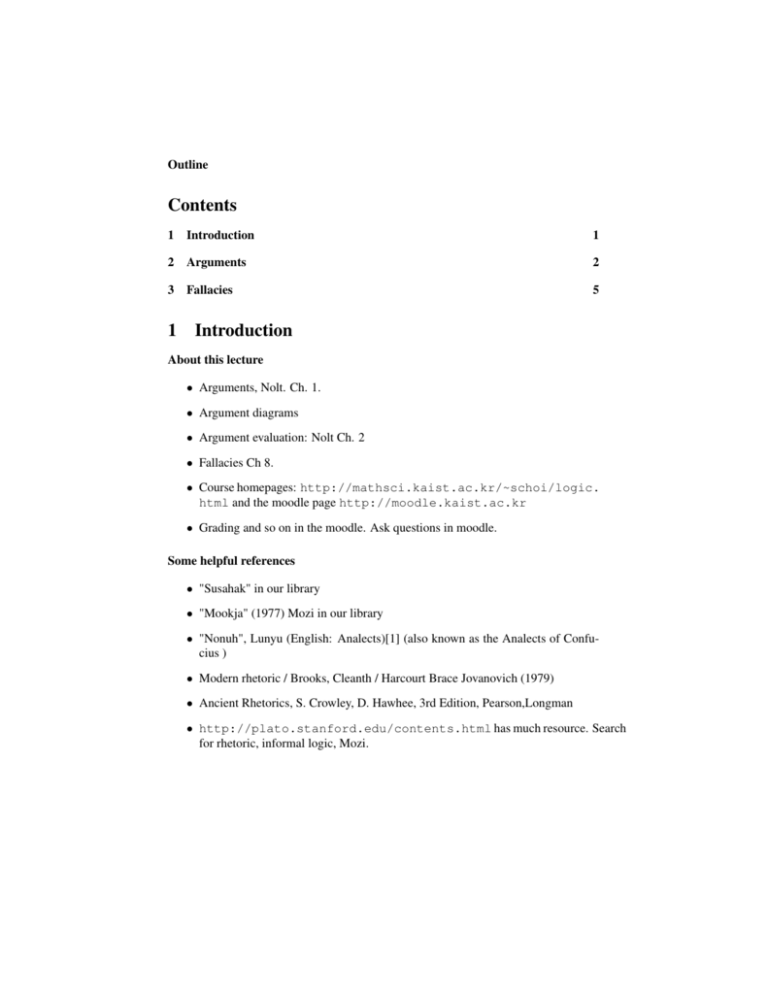
Outline
Contents
1
Introduction
1
2
Arguments
2
3
Fallacies
5
1
Introduction
About this lecture
• Arguments, Nolt. Ch. 1.
• Argument diagrams
• Argument evaluation: Nolt Ch. 2
• Fallacies Ch 8.
• Course homepages: http://mathsci.kaist.ac.kr/~schoi/logic.
html and the moodle page http://moodle.kaist.ac.kr
• Grading and so on in the moodle. Ask questions in moodle.
Some helpful references
• "Susahak" in our library
• "Mookja" (1977) Mozi in our library
• "Nonuh", Lunyu (English: Analects)[1] (also known as the Analects of Confucius )
• Modern rhetoric / Brooks, Cleanth / Harcourt Brace Jovanovich (1979)
• Ancient Rhetorics, S. Crowley, D. Hawhee, 3rd Edition, Pearson,Longman
• http://plato.stanford.edu/contents.html has much resource. Search
for rhetoric, informal logic, Mozi.
2
Arguments
Argument
• What is an “argument"?
• It is an attempt to convince some one of certain beliefs.
• This was developed by ancient rhetorics by Greek Sophists , Roman Orators
(Cecero), Arab philosophers, and Chinese philosophers (Mozi).
• The Logicians or School of Names was a Chinese philosophical school that grew
out of Mohism in the Warring States Period. (See Stanford)
• Confucius arguments are mainly about how to bring humane natural compulses
out of any one.
• Indian logic (Very developed and complete)
• Buddhism (The west learned it mostly from the Japanese.)
• Mostly, these involve much emotional components. Seizing the moments...
• Exercise: Find some such arguement as a homework. To be submitted together
with Preview report.
• Plato condemned the Sophists.
• Aristotelian Syllogism: (http://en.wikipedia.org/wiki/Syllogism)
(superceded by Frege and Russel.)
• Aristoles Rhetoric (a book to Alexander). There are also books by Sophists for
example by Isocrates.
Modern rhetorics
• In the modern times, we use "just the facts, please".
• Opinions of majority of people (or experts) are considered facts.
• Use examples.
• Mathematical arguments are limited to logical steps only. So this is very much
distinctive.
• One follows the logic of Russel and Frege as only valid form of arguments.
• This is the formal logic (This is the content of Nolt, Ch. 3-7)
• Informal logic is the attempt to develop a logic to assess, analyse and improve
ordinary language (or "everyday") reasoning
2
Mathematical arguments
• All humans are mortal. Socrates is human. Therefore, Socrates is mortal.
• Since the U.S. federal reserve has issued too much money, there will be inflation.
• China has many intelligent people. Thus, China must soon become very rich.
• Which of the above is right?
• The arguments involve premise (for, since, because, assuming that) and conclusions. (Therefore, thus, hence, accordingly...)
Some exercises
• Arguments has to be put in order of premise and then conclusion.
• One often need to break down the sentences into “atomic” pieces.
• This means that you break them down until no further decomposition can be
done. (Linguistically always possible. So we assume or enforce.)
√
– 2 cannot be expressed as a ratio of two integers
– All rational number is expressible as a ratio of two integers.
√
– Thus, 2 is not a rational number.
Argument diagram
• Label the atomic sentences.
• One groups atomic sentences into groups that implies another atomic sentence
excluding any sentence that is not needed.
• The result has no cycles for the argument to be valid.
• Outside the formal logic, one can still draw argument diagrams..
•
– Seoul has most of the resources of Korea.
– People need resources to be in their city.
– Therefore, many people came to Seoul.
– Hence, Seoul has too much population.
– Too much people in Seoul create problems.
– Seoul should not have the problems.
– We must disperse the population to other places.
• 1-+ 2 -> 3 -> 4 + 5+6 -> 7
3
• China must grow fast or there will be instabilites.
• China must not become unstable.
• If a large country becomes unstable, then the nearby country suffers.
• China is large.
• South Korea is a nearby country.
• South Korea must not suffer.
• Therefore China must grow fast.
• 3+4+5+6-> 2 + 1 -> 7
Argument evaluation
• This is mostly in informal logic.
• Truth of premises
• Deductive argument: If all the premise is true, then the conclusion must be true.
i.e., the coclusion is necessary.
• Inductive argument (Strong, weak): here, the conclusion is not necessary but
often with large probability.
• Valid arguments: A deductive argument
• Invalid arguments: non-deductive argument (includes inductive ones)
• Any conclusion follows deductively from inconsistent premises.
Examples
• Some pigs have wings.
• All winged things sing.
• Therefore, pigs sing.
• All mathematical theorems are always true.
• The Black-Scholes equation is a mathematical theorem.
• Therefore, the Black-Scholes equations is always true.
4
3
Fallacies
Fallacies
• Mistakes or deceptions in arguments. See Stanford under informal logic. There
are criticisms against classifying fallacies but ....
– Fallacies of relevance
– Circular reasoning
– Semantic fallacies
– Formal fallacies
– False premise.
Fallacies of relevance
• Ad hominem
• The kind
– Ad hominem abuse: attacks a person’s age, character, ethnicity, personality,...
– guilt by association: attacks the company he or she keeps
– Tu quoque: attacks that a person has a double standard.
– Vested interest: a proponent is motivated by greed
– Circumstantial ad hominem: a proponent is endorsing a conflicting propositions.
Fallacies of relevance II
• Straw man argument: refutes a claim by confusing with less plausible claim.
• Ad baculum: Apeal to force.
• Ad verecundiam: Apeal to authority
• Ad populum: Apeal to the people
• Ad misericordiam: Apeal to pity
• Ad ignoratium: Apeal to ignorance
• Ignoratio elechi: missing the point.
• Red herring: tangential matter to divert attention.
5
Fallacies of relevance: examples
• Teachers are opposing teaching evaluations. They will live comfortably if there
are no teaching evaluations. Therefore, we must implement teaching evaluations.
• The minister of education said that there will be no college enterance exams in
five years. I am going to college 5 years later. Therefore, I don’t have to study.
• Since the father of former president XXX is a sleazy person, we cannot trust
XXX.
Circular reasoning
• Circular reasoning: the argument assume the conclusion
– Question begging epithets: phrases that prejudice discussion
– Complex question: question tricks people into the desired conclusion
Semantic fallacies
• Ambiguity (equivocation): multiple meaning
• Amphiboly: ambiguity in the level of sentence structures.
• Vagueness: indistinctiveness of words
– doublethink: every sentence cancels outs its predecessor and its successor.
Orwell’s 1984.
– Accent; generate multiple interpretations.
Inductive fallacies
• Hasty generalization: generalizing from insufficient number of cases
• Faulty analogy:
• Gambler’s fallacy: something will keep being so.
• False cause : confusing cause.
• Formal fallacies: logical mistakes
• Fallacies of false premise (slipperly slope also)
6


